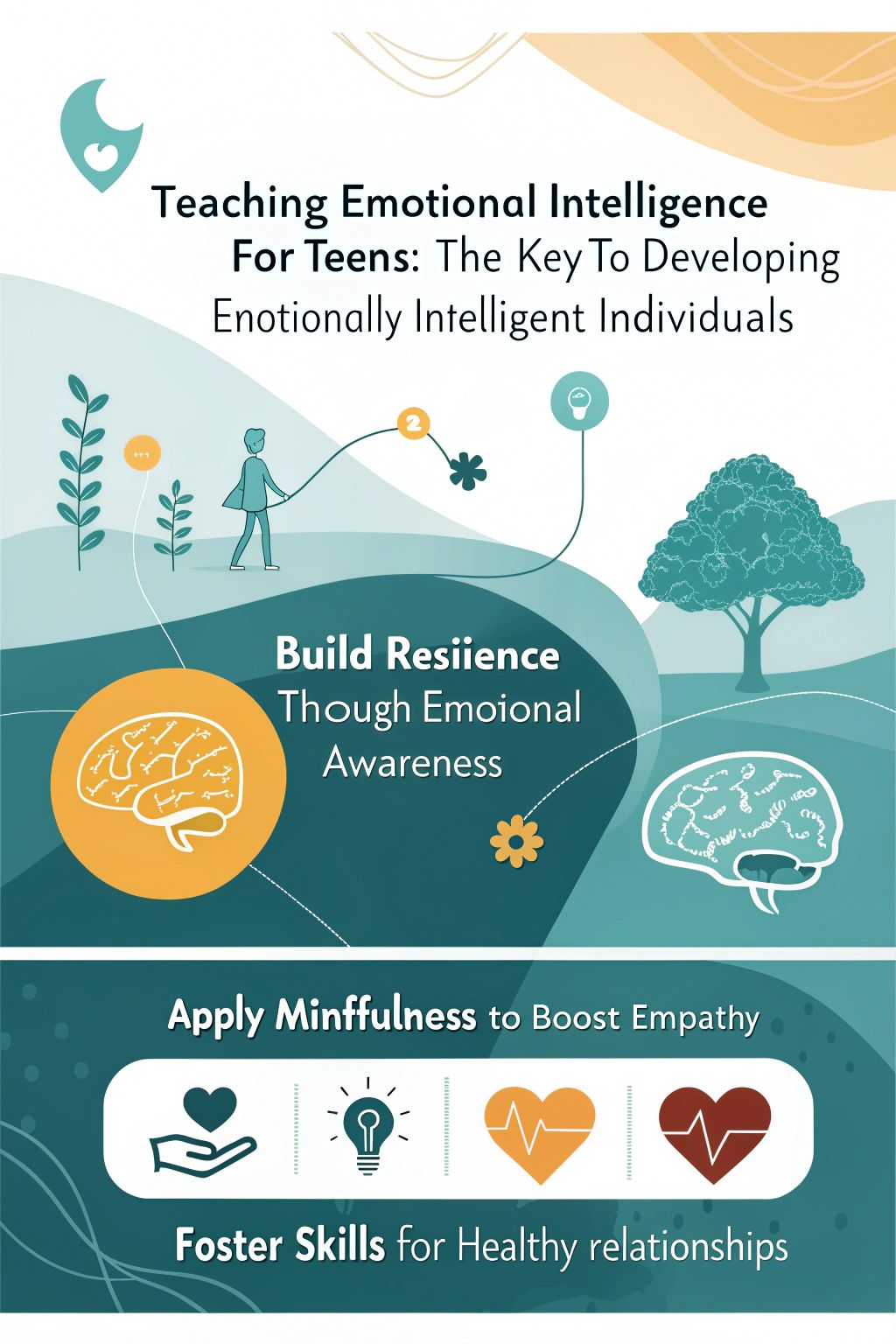Parents and teachers frequently question how they can assist teens in managing their emotions. They observe young individuals grappling with their feelings, yet they remain unsure of how to intervene effectively.
This is where emotional intelligence for teens enters the picture. Emotional intelligence is not merely a complex term; it’s the ability that permits us to comprehend and control our emotions and also enables us to identify and sway other people’s emotions.
Studies suggest that this kind of intelligence might play a more significant role than traditional knowledge in achieving practical success. Our blog serves as a resource for understanding why emotional intelligence holds such importance during the teenage years.
It will propose approaches for enhancing these abilities in youth. Continue reading to gain insights into creating a beneficial shift in a teen’s life.

Understanding Emotional Intelligence (EI)

Developing Emotional Intelligence (EI) in adolescents is vital for fostering resilience, improving relationships, and navigating the trials of adolescence.
Definition of EI
Emotional intelligence (EI) represents the ability to comprehend and control one’s emotions, including an understanding of the sentiments of others. It encloses four key abilities: recognising personal emotions, handling them effectively, gauging the feelings of others, and fostering healthy relationships through this sensitivity.
This ability empowers individuals to react to situations with emotional maturity and empathy.
The notion plays a significant part during adolescence. Teenagers frequently grapple with stress from academic tasks, social interactions, and challenges related to personal development.
Possessing robust emotional intelligence equips them to handle these pressures more effectively. They learn to control stress, decrease anxiety levels, and cultivate stronger relationships with peers and adults alike.
Tools such as cognitive behavioural therapy exercises or mindfulness practices can augment their EI skills by instructing them in self-awareness and emotion regulation strategies in pragmatic ways.
Importance of EI in adolescence
Adolescence brings intense emotions due to fluctuations in hormones and the body. Teens possessing high emotional intelligence (EI) are more adept at comprehending their feelings. They exhibit self-confidence, self-compassion, and robust bonds with others.
All these attributes assist them in traversing family issues, friendships, academic challenges, and self-discovery.
Educating teens about EI is vital since it reduces stress, averts exhaustion, amplifies resilience, enhances relationships, augments problem-solving skills, and heightens overall contentment in life.
Cultivating EI skills helps adolescents not solely in the academic field but across all life facets by empowering them to control their emotions effectively. This encourages academic achievement and personal development during these pivotal years.
The Impact of Emotional Intelligence on Teen Mental Health
Additionally, cultivating emotional intelligence in adolescents can also foster stronger interpersonal skills and better relationships with others, thereby promoting healthier social and emotional development in teens.
Connection between EI and mental well-being
Emotional intelligence (EI) serves as a cornerstone for sound mental health. Adolescents possessing high EI exhibit reduced probabilities of anxiety and depression. They exhibit superior comprehension of their own emotions.
This comprehension assists them in managing stress with greater efficiency. Emotionally intelligent adolescents can also address the fluctuations of life with heightened resilience.
Gaining command over emotions considerably influences adolescents’ wellness. Those possessing refined emotional intelligence skills find rebounding from setbacks less challenging. They also benefit from improved relationships.
High EI enables adolescents to comprehend others’ emotions, enhancing empathy and societal bonds, which are integral for mental health.
Role of EI in managing stress and anxiety
Teaching teens to recognise and understand their feelings has a significant role in aiding them to control stress and anxiety. This skill is the essence of emotional intelligence (EI).
Teens possessing robust EI can perceive their emotions, comprehend the reasons, and aptly manage those emotions. This skill is necessary to alleviate stress levels and stop anxiety from dominating.
Employing tactics such as cognitive behavioural therapy (CBT) and mindfulness, along with imparting effective emotion management techniques, are measures to augment EI in teenagers.
These strategies empower teens to confront difficulties directly without succumbing to adverse feelings. They acquire coping methods that foster resilience, thereby enhancing their mental well-being considerably.
By nurturing EI, teenagers deal with stress more effectively and also heighten their overall contentment in life.
Strategies to Enhance Emotional Intelligence in Teens
Teens can enhance their emotional intelligence by encouraging self-awareness. They can learn to identify and understand their own emotions, which is crucial in developing EI. Moreover, teaching effective emotion management techniques empowers teens to navigate and regulate their emotions more effectively, promoting mental well-being.
Encouraging self-awareness
Encouraging self-awareness in teenagers helps them become more emotionally intelligent. They learn to identify and label their emotions, such as saying “I feel frustrated” when they are upset.
This practice leads to better emotion management throughout daily life.
One way to boost self-awareness is through daily emotional awareness exercises. These activities allow teens to understand their feelings better and manage them effectively. It gives teens the tools they need for personal growth and resilience, laying a foundation for healthier emotional responses in various situations.
Teaching effective emotion management techniques
Instructors and guardians can guide adolescents in better emotion control via a range of methods. One such method entails moderating one’s breath and picturing serene settings for a tranquil mind, an aspect of mindfulness instruction vital for emotion control.
Recommending physically engaging activities like workout sessions or dancing provides adolescents a healthy channel to express their suppressed emotions.
Guiding them to thoroughly process their emotions before reacting could hinder impulsive actions. It enables them to comprehend their emotions and decide the right response. These methods contribute to the development of self-awareness and emotional wisdom, vital for dealing with life’s hardships effectively.
Promoting empathy and interpersonal skills
Empathy lets us picture how others feel and respond rightly. It matters a lot in teaching teens to become emotionally intelligent. We should get them to imagine being in someone else’s shoes.
This helps them understand other people’s emotions without getting overwhelmed by them. Teens learn the value of support and kindness through this.
Building good social skills is also key for teens. They need these skills to form strong relationships and handle conflict well. We can use activities like role-playing or group discussions to improve these skills.
These methods make teens comfortable with talking about feelings and working out disagreements in positive ways.
Practical Tips for Parents and Educators
Encourage open communication about emotions with your teen, providing a safe space for them to express their feelings without judgment. Help teens identify and develop coping strategies to manage emotional challenges effectively, fostering their resilience and mental well-being.
How to talk about emotions openly
To talk about emotions openly, it is crucial to create a safe and non-judgemental environment for teens. Encouraging open discussions about feelings can nurture self-awareness and emotional intelligence in adolescents.
Utilising active listening skills, while avoiding criticism or judgement, enables individuals to feel heard and understood, strengthening emotional bonds and enhancing communication.
Empathetic language should be promoted within the family dynamic, providing opportunities for each member to express their emotions without fear of invalidation or dismissal. Through regular dialogue around feelings, the stigma associated with discussing emotions can be reduced, ultimately empowering teenagers to manage their emotional well-being effectively.
Using “I” statements during conversations, such as “I felt X when you said Y,” provides specific examples that demonstrate how emotions are experienced, fostering a deeper understanding of one’s own and others’ feelings.
Methods to help teens cope with emotional challenges
Teens dealing with emotional challenges can benefit from various methods to manage their feelings effectively. Encouraging self-expression by providing outlets for creative activities, such as art or music, can be pivotal in helping teens cope with their emotions and reducing stress levels.
Moreover, teaching cognitive behavioral techniques empowers teenagers to recognise and address negative thought patterns, contributing to improved emotional regulation. Providing a safe space for open communication at home or in educational settings is vital for teens to feel supported during times of emotional difficulty.
Furthermore, incorporating mindfulness practices into daily routines has been shown to alleviate anxiety and promote mental well-being among young individuals. Techniques like deep breathing exercises and guided visualisations offer practical tools for managing emotions in a healthy way.
Additionally, engaging in physical activities like exercise or dance not only releases pent-up emotions but also fosters a sense of empowerment and control over one’s emotional state.
By integrating these strategies into the lives of teenagers, parents and educators are better equipped to guide them through challenging emotional experiences.
Activities to encourage healthy emotional expression
Teens can benefit from activities that promote healthy emotional expression. Encouraging journaling allows them to process and articulate their feelings, aiding in self-awareness. Utilising art therapy, such as painting or drawing, provides an outlet for emotional release.
Moreover, group exercises like role-playing scenarios can enhance empathy and interpersonal skills in teens. Engaging in physical activities like yoga or meditation also helps manage stress and promotes overall emotional well-being.
By emphasising constructive methods of emotional expression through these diverse activities, teens are equipped with valuable tools for understanding and managing their emotions effectively while fostering empathetic relationships with others.
Building Better Relationships Through EI
Teaching emotional intelligence (EI) to teens is vital for fostering healthy relationships and conflict resolution. Empathy, a key component of EI, enables individuals to recognize others’ emotions, contributing to stronger connections and effective communication. Understanding emotions and their impact can aid in developing more fulfilling relationships. For more insightful strategies on nurturing emotional intelligence in teens, keep reading.
Importance of EI in forming and maintaining relationships
In addition, it should be noted that emotional intelligence (EI) plays a crucial role in forming and maintaining relationships, as it enables individuals to understand and manage their own emotions while empathising with others.
Research has shown that high EI fosters effective communication, supports conflict resolution, and contributes to the development of strong interpersonal connections. By recognising and regulating one’s emotions, teens can build healthier relationships with peers, teachers, family members, and the wider community.
Encouraging emotional awareness and empathy equips adolescents with essential skills for navigating social interactions and fostering meaningful connections.
Moreover, studies have indicated that individuals with higher levels of emotional intelligence tend to have more satisfying relationships. This is because they are better equipped to perceive nonverbal cues from others accurately and respond appropriately.
By understanding their own emotions and those of others, teenagers can develop stronger bonds based on trust, respect, and mutual understanding – crucial elements for maintaining healthy relationships throughout life.
How EI contributes to conflict resolution
Emotional intelligence (EI) plays a vital role in conflict resolution, as it improves individuals’ ability to understand and manage emotions effectively. By developing self-awareness and empathy, teens can navigate conflicts with greater insight into their own emotions and those of others.
This allows them to communicate more effectively, reduce tense situations, and find mutually beneficial solutions. Studies have shown that high emotional intelligence is linked with lower levels of aggression and higher levels of cooperation in interpersonal relationships, providing a strong foundation for resolving conflicts amicably.
EI also equips teens with the skills to recognise triggers that may lead to conflict, enabling them to regulate their responses and approach contentious situations with a calm demeanour.
This not only fosters better communication but also reduces the likelihood of confrontations escalating into larger issues. Furthermore, by promoting emotional regulation and perspective-taking abilities, EI helps teenagers build resilience in handling conflicts constructively rather than reacting impulsively or aggressively.
Through these mechanisms, EI significantly contributes to fostering peaceful resolutions within personal relationships as well as wider social dynamics.
Teaching Emotional Intelligence to Kids: Laying the Foundation for EI in Teens
Children’s emotional intelligence sets the stage for their later development in adolescence, shaping their capacity to comprehend and manage emotions. Early fostering of self-awareness and effective emotion management strategies forms a pivotal basis for nurturing emotionally intelligent teenagers.
Instilling empathy and interpersonal skills from an early age equips children with the means to cultivate healthy emotional expression, fostering mental well-being as they move into the trials of adolescence.
Parents and educators have indispensable roles in offering practical guidance to aid children in navigating emotions, ensuring their adept handling of stress, anxiety, and maintenance of robust relationships as they mature.
As children steadily develop emotional resilience through these foundational experiences, they are better prepared to confront the intricacies of the teen years with assurance and maturity.
By instilling emotional intelligence in childhood, we set teenagers on a course towards enhanced mental health, improved relationships, and heightened overall life satisfaction as they progress through the crucial developmental stage of adolescence.
Conclusion
Moreover ensures that developing emotional intelligence continues throughout one’s lifespan—from childhood to adulthood—shaping individuals into emotionally intelligent adults.
For more insights on laying the foundation of emotional intelligence in younger children, visit our guide to teaching emotional intelligence to kids.
MindOwl Founder – My own struggles in life have led me to this path of understanding the human condition. I graduated with a bachelor’s degree in philosophy before completing a master’s degree in psychology at Regent’s University London. I then completed a postgraduate diploma in philosophical counselling before being trained in ACT (Acceptance and commitment therapy).
I’ve spent the last eight years studying the encounter of meditative practices with modern psychology.

